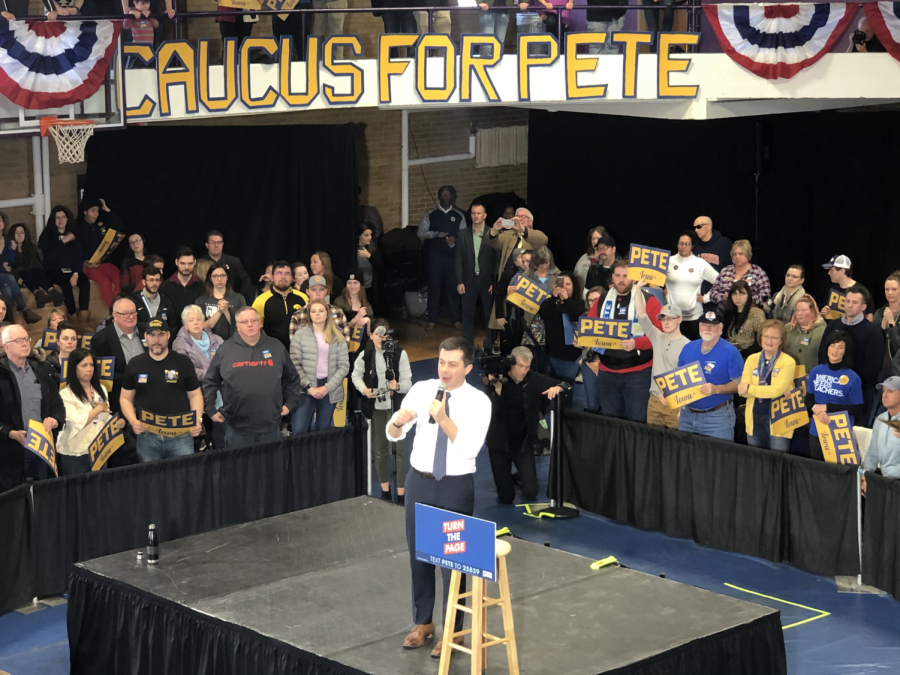In a Nutshell: Pete Buttigieg
The Great Democracy Field Trip
Former South Bend Mayor Pete Buttigieg addresses a rally in Dubuque, Iowa. The crowd was energized but mostly on the older side.
February 2, 2020
News Editor Casey Murray is on the ground in Iowa, covering the caucuses. His ongoing series “In a Nutshell” will report on the various candidates vying for the Democratic nomination.
DUBUQUE, IOWA — “Scholarship and Service” is perhaps the crux of Pete Buttigieg’s campaign for the Presidency of the United States.
The Rhodes Scholar, Harvard graduate, and naval intelligence officer was introduced as such by a trio of university students, the first of whom inaugurated the event by relating an active shooter anecdote, but he invoked those credentials only tangentially over the course of the hour-long event.
Mr Buttigieg instead placed emphasis on his service as the former mayor of South Bend, Indiana. He tapped Waterloo, Iowa Mayor Quentin Hart to serve as one of his introductory speakers as part of his argument that mayors are more experienced at compromise than other government officials, implicitly drawing a contrast with Senators Bernie Sanders (I-Vt), Elizabeth Warren (D-Mass), and Amy Klobuchar (D-Minn).
“We don’t shut down city government just because the two parties don’t agree on something,” he said. The small size of South Bend in comparison to other major American cities would help him “make sure [that] communities of every size are heard in Washington.”
The rally was attended by roughly 300 people in the Loras College Field Field House in Dubuque, Iowa — a city of some 60,000 people in the heart of the Driftless Area. The crowd was overwhelmingly old and white.
It was marked by a more cerebral brand of politics that clearly seeks to imitate that of former President Barack Obama. Mr Buttigieg attempted a joke about the noun usage of the word “hopeful” and drew laughter when he mentioned his intention to “reunite some of these Senators with their consciences” should the Senate give the Merrick Garland treatment to one of his Supreme Court nominees.
The thesis of the rally was that there exists a broad consensus in America that things need to change. How that change would be achieved was not of extraordinary interest.
“On issue after issue after issue that affects our personal lives, we have a majority that agrees… this is a country that is ready for solutions,” he said.
He made limited use of prosopopoeia, telling an anecdote about a preschool teacher who had to get a second job in order to make ends meet, and another about a high school student who was abandoned by her father and could empathize with children in war-torn regions of the world.
“Surely Washington can have as much moral imagination as a high schooler in Iowa,” Mr Buttigieg said, hewing to a common theme in his stump speech: that Washington is not reflective of the American people and needs serious change.
“I do not believe the old playbook will work,” he said. “It’s time for something new.”
He was mostly reticent about the specific nature that change would take. He made passing comments about reproductive health, equality of opportunity, and declared that “the filibuster has outlived its usefulness, and it’s time for it to go” to thunderous applause, but did not mention his proposals to overturn Citizens United v. FEC, abolish the Electoral College, or overhaul the Supreme Court.
Climate change, on the other hand, was central to his speech; he promised to double the generation of clean energy by 2025, a goal that would require making more progress in five years than in the last seven decades, and reach net zero by 2050.
“The longer you’re planning to be here,” he said in response to a question from an 11-year-old girl, “the more you have at stake in this. I’m the youngest candidate running for President.”
Mr Buttigieg acknowledged that tackling climate change would be a significant challenge, but expressed confidence that America could be a leader in climate action.
“Climate has to be one of those national projects,” he said. Leading in climate action would improve America’s image abroad, he added.
Foreign policy and voluntarily national service were also given time on the stump, but Mr Buttigieg’s principal message was that there is a consensus about how to get things done. He closed the rally with a statement about hope in the face of the hyperpolarization of American society.
“There’s one word I want to leave you with, and that’s the importance of hope,” he said. “Take the hope you brought in here, bundle it up, and share it with a person who will take more from a word from you than an ad from me.”
Mr Buttigieg is drawing 15.8 percent in the most recent polls, trailing Mr Sanders, Joe Biden, and narrowly leading Ms Warren. Whether or not his message of unity will win him a ticket to New Hampshire remains to be seen.








Chester • Feb 3, 2020 at 9:17 am
When will you write about Michael Bloomberg, who has never taken a dime from special interests?